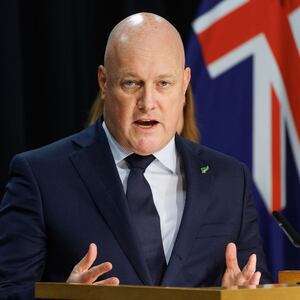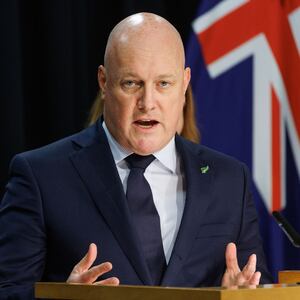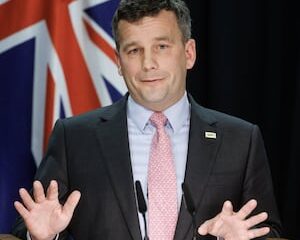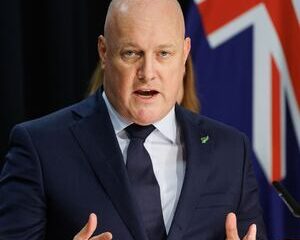Politics
Government Unveils $230 Million Medical School at Waikato University

A new medical school will be established at the University of Waikato with a funding commitment of $230 million, as announced by the Government of New Zealand. This initiative aligns with the National Party’s campaign promise during the 2023 election. The decision follows a coalition agreement with the Act Party, which mandated that the establishment of the school be contingent on a thorough business case.
During a press conference on Monday, Health Minister Simeon Brown and Universities Minister Shane Reti confirmed that the Cabinet has approved the business case for the new medical school. “Cabinet has approved the business case for the new school, which will have a strong focus on primary care and rural health,” Brown stated.
$82.85 million will be provided by the Government, while over $150 million will be contributed by the university, supported by philanthropic investments. Brown emphasized that this represents a significant commitment to both education and regional development in the Waikato area. He added that the decision paves the way for the university to commence construction on new teaching facilities later this year and to start planning for clinical placements. This initiative aims to expand opportunities for students to study medicine in New Zealand.
The new medical school is set to start accepting students in 2028, with an annual capacity of 120 medical training places. This is in addition to the 100 additional medical training places being introduced across the University of Auckland and University of Otago during this government’s term.
The proposal for a new medical school sparked controversy during the election campaign. The Labour Party opposed the idea, advocating instead for an increase in places within New Zealand’s existing medical schools rather than establishing a new institution.
The Government’s latest announcement marks a pivotal moment in New Zealand’s approach to medical education, reflecting a strategic focus on addressing healthcare needs, particularly in rural communities. As the country prepares for the construction of this new facility, stakeholders will be closely monitoring its impact on the healthcare landscape and the educational opportunities available to future medical students.
Politics
Government Unveils $230 Million Medical School at Waikato University

The Government has announced the establishment of a new medical school at the University of Waikato, with an investment of **$230 million**. This initiative follows commitments made by the National Party during the **2023 election**, where they campaigned on the promise of building a new medical school. The decision to proceed with the project comes after a coalition agreement with the Act Party, which stipulated that any establishment of the school would depend on a thorough business case.
On **Monday**, Health Minister **Simeon Brown** and Universities Minister **Shane Reti** confirmed that the Cabinet had approved the business case for the new school. “Cabinet has approved the business case for the new school, which will have a strong focus on primary care and rural health,” Brown stated. He highlighted the significant financial backing, which includes **$82.85 million** from the Government and over **$150 million** from the University, in addition to philanthropic investments. This allocation represents a major commitment to education and regional development in the Waikato region.
Construction and Future Prospects
Brown indicated that with the green light received, the University of Waikato is set to commence construction on new teaching facilities later this year. The new medical school is expected to enhance opportunities for students wishing to study medicine in New Zealand. Starting in **2028**, the school will provide **120 medical training places** each year. This expansion complements the **100 additional medical training places** being added across the University of Auckland and University of Otago during the current Government’s term.
The proposal for a new medical school has not been without controversy. During the election campaign, the Labour Party expressed opposition to establishing a new medical institution, preferring instead to focus on increasing enrollment in existing medical schools. This divergence of views reflects ongoing debates about how best to address healthcare education and workforce needs in New Zealand.
The announcement marks a significant step in bolstering medical education and aims to address regional health challenges by prioritizing primary care and rural health training. As the project progresses, it will undoubtedly shape the future of medical education in New Zealand, providing a pathway for more students to enter the healthcare sector.
Politics
Proposed Changes to Working for Families Risk Financial Strain

A recent warning from FinCap, an organization representing financial mentors across New Zealand, highlights potential adverse effects of proposed changes to the Working for Families scheme. These alterations, announced as part of the Government’s budget considerations, aim to address the issue of debt accumulation among families relying on the scheme.
According to the Government, the proposed reforms intend to find solutions to prevent the common occurrence of overpayment debts associated with the Working for Families programme. In the 2022 tax year, only 24% of households receiving either weekly or fortnightly payments from the scheme were correctly assessed by the Inland Revenue Department (IRD) at the end of the tax year. This miscalculation often leads to families facing unexpected debts when their earnings exceed initial estimates.
The concern from FinCap centers on the impact these proposed changes could have on families already struggling with financial challenges. Many families rely heavily on the Working for Families payments to meet their daily expenses. If the reforms inadvertently result in lower payments or increased complexity in the system, some families could find themselves in a worse financial position than before.
FinCap’s representatives emphasize the need for a careful evaluation of the proposed changes. They argue that without adequate support mechanisms, families may be left vulnerable to mounting debts that they are ill-equipped to manage. The organization advocates for transparency and clarity in the reform process to ensure that families can understand their financial entitlements and avoid unexpected financial burdens.
As the Government deliberates on these changes, it is crucial to consider the real-world implications for families reliant on this support. The financial stability of these households is paramount, and any proposed modifications should prioritize their well-being and financial security.
Stakeholders will be closely monitoring the situation as discussions progress. Ensuring that the Working for Families scheme continues to provide essential support without inadvertently placing families at greater risk of debt will be vital for maintaining its intended purpose. The outcome of these proposed changes could significantly influence the financial landscape for many households across New Zealand.
Politics
New Zealand Government Unveils $6 Billion Infrastructure Plan

Prime Minister Christopher Luxon announced today that the New Zealand Government plans to initiate a series of infrastructure projects valued at approximately $6 billion before the end of the year. This significant investment focuses primarily on upgrades to hospitals and roadways, aiming to enhance public services and improve transportation across the country.
The announcement, made in conjunction with Ministers Nicola Willis and Chris Bishop, outlines an ambitious list of projects scheduled to commence prior to Christmas. Among the key initiatives, the Government will launch the Hutt Valley Te Whare Ahuru Acute Mental Health Unit, which is expected to significantly improve mental health services in the region.
In addition to mental health facilities, the Government is set to undertake vital upgrades at several hospitals, including the Wellington Kidz First and McIndoe Building Recladding projects, as well as the Auckland City Hospital and the Dunedin Hospital. These upgrades aim to enhance the quality of care available to patients and ensure that facilities meet modern safety standards.
The infrastructure plan also includes extensive road improvements. Significant projects such as the Auckland SH22 Drury Corridor Upgrade and the Auckland Waihoehoe Road Upgrade are intended to alleviate traffic congestion and improve connectivity in urban areas. Other road projects encompass the Horowhenua SH2 Melling Interchange and upgrades on SH29 Tauriko in the Bay of Plenty region.
While the government has detailed many of the projects, it is understood that several significant components of the $6 billion valuation remain undisclosed for commercial reasons.
This comprehensive infrastructure initiative reflects the Government’s commitment to enhancing public services and economic development across New Zealand. As these projects begin to roll out, they are expected to create numerous job opportunities and stimulate local economies, reinforcing the importance of infrastructure investment in the nation’s recovery and growth.
The announcement marks a critical step in the Government’s broader strategy to address pressing needs in healthcare and transportation, ensuring that New Zealand’s infrastructure meets the demands of its growing population. With the projects set to commence soon, local communities can anticipate the positive impact these developments will bring.
Politics
New Zealand Defence Minister Urges Army Recruits to Prepare for Combat

The latest graduation ceremony for the New Zealand Army welcomed 153 new soldiers, with Defence Minister Judith Collins addressing the recruits amid rising global tensions. As the world confronts complex geopolitical challenges, Collins emphasized the importance of readiness for potential combat. The event took place at the Waiōuru Military Camp, where the recruits completed a rigorous 15-week training program.
During her address, Collins highlighted the significance of New Zealand’s contributions on the international stage, despite the country’s relatively small size. She stated, “Conflicts are escalating, the rules-based international order is under pressure and great power competition is reshaping the world around us.” Her remarks underscored that New Zealand stands firm in its principles, asserting that “might is not right” and reaffirming the nation’s commitment to peace and cooperation.
Emphasizing Commitment in Uncertain Times
Collins braved severe weather conditions to attend the ceremony, reflecting her dedication to the armed forces. She reminded the graduates that their training and future service play a vital role in maintaining security and stability. The Defence Minister’s message resonated with the recruits, who are entering a military landscape defined by uncertainty and evolving threats.
The training program at Waiōuru equips soldiers with essential skills, preparing them for various scenarios they may encounter in their military careers. The Minister’s speech served as a reminder of the changing nature of warfare and the growing complexities faced by modern militaries.
Collins remarked on the importance of standing up for those who cannot defend themselves, reinforcing New Zealand’s ethos as a principled nation dedicated to upholding international norms. “We may be a small country, but we are a principled one,” she stated, encouraging the recruits to take pride in their service.
Global Context and Future Challenges
The backdrop of rising global tensions has placed increased scrutiny on military preparedness and international alliances. As countries navigate a landscape marked by conflict and competition, New Zealand’s role in contributing to global peacekeeping efforts is more crucial than ever.
Collins’ address reflects a broader commitment from the New Zealand government to ensure its armed forces are equipped and ready to respond to emerging threats. The recruits, now officially soldiers, are poised to represent their country in a world that demands strength and resilience.
This graduation ceremony marks not only a significant achievement for the new soldiers but also a reaffirmation of New Zealand’s strategic priorities in a rapidly changing international environment. As they embark on their military careers, these recruits carry the weight of their country’s values and the realities of global security challenges.
-

 Politics1 week ago
Politics1 week agoDavid Seymour Proposes Fast-Track Law for New Supermarkets in NZ
-

 Top Stories6 days ago
Top Stories6 days agoTragic Crash Claims Three Lives on Masters Rd Near Waiuku
-

 Entertainment1 week ago
Entertainment1 week agoGeorge Calombaris Opens Up About Alcohol Struggles After Scandals
-

 World1 week ago
World1 week agoDaughter Accused of Murdering Mother in Khandallah Home
-

 World1 week ago
World1 week agoDriver High on Magic Mushrooms Crashes with Child in Car
-

 Top Stories1 week ago
Top Stories1 week agoTauranga Airline Suspended After Safety Concerns Arise
-

 Health1 week ago
Health1 week agoWoman’s Missing Engagement Ring Found in Waiuku Mudflats
-

 World7 days ago
World7 days agoCoalition Leaders Address UN Rapporteur’s Criticism, Clarify Response
-

 World1 week ago
World1 week agoKalyn Ponga Explores Future Options Amid Newcastle Knights Struggles
-

 Business7 days ago
Business7 days agoSouth Waikato Trades Training Centre Faces Closure Proposal
-

 World7 days ago
World7 days agoQueenstown’s The Rees Hotel Fined $22,000 for Illegal Crayfish Sales
-

 Business7 days ago
Business7 days agoMediaWorks Secures $350 Million Outdoor Advertising Contracts












